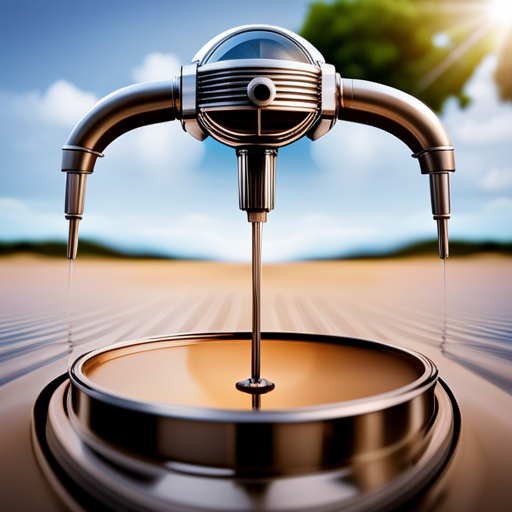Are you considering purchasing a reverse osmosis (RO) system to purify your water, but concerned about the significant amount of wastewater it produces? Or perhaps you already have an RO system installed and want to minimize its environmental impact.
Whatever your situation, this article will provide valuable insights into why RO systems waste water and how to reduce this waste.
RO systems are an innovative technology that uses a semi-permeable membrane to remove contaminants from water. However, this process also produces a significant amount of wastewater, which can be wasteful and environmentally harmful if not properly managed.
In this article, we will explore the reasons for this wastewater production, as well as the maintenance requirements for different types of RO systems. We will also provide practical tips on how to reduce the amount of wastewater produced by your RO system so that you can make the most of this technology without compromising your environmental values.
Key Takeaways
– RO systems produce a significant amount of wastewater, which contains high levels of contaminants and is unsafe for drinking.
– Regular maintenance, including cleaning and filter replacement, is crucial to ensure the RO system is functioning properly and to reduce the amount of wastewater produced.
– One way to minimize wastewater is by regularly replacing the RO system’s filters, which have a limited lifespan of 2-3 years and become less effective over time.
– Using alternative filtration methods in combination with an RO system can also reduce the amount of wastewater produced and extend the life of the system’s membrane and filters.
Reasons for Wastewater
You already know that reverse osmosis systems produce wastewater because of two main reasons: system design and protecting the membrane.
Firstly, RO systems are designed to remove all impurities from water, and this process produces concentrated water containing contaminants, which is known as wastewater.
Secondly, the membrane used in the RO system is delicate, and the concentration of contaminants can damage it. Therefore, reject water ensures that the membrane is well-protected and lasts longer.
The wastewater disposal from RO systems has an environmental impact. The average amount of wastewater produced by RO systems is four times the amount of pure water produced, which is a significant amount.
The wastewater contains high levels of contaminants, making it unsafe for drinking and hazardous to health. Additionally, the process of producing wastewater requires more energy, and this can lead to higher carbon emissions.
Therefore, it’s important to reduce wastewater and ensure proper disposal to minimize the environmental impact.
RO System Maintenance
Regular maintenance is crucial in ensuring that the semi-permeable membrane and filters of the reverse osmosis system are functioning properly and producing clean drinking water. Regular cleaning and filter replacements can help extend the lifespan of the RO system and reduce the amount of wastewater produced. Here are five reasons why regular maintenance is important:
– Regular cleaning helps remove any buildup of minerals or debris that can clog the system and reduce its efficiency.
– Replacing filters on time ensures that the system is removing contaminants effectively and efficiently.
– Proper maintenance reduces the amount of wastewater produced, saving water and money on utility bills.
– Neglecting maintenance can result in costly repairs or the need for a new system altogether.
– Maintaining your RO system ensures that you and your family have access to clean, safe drinking water.
By following a regular maintenance schedule, you can keep your RO system running smoothly and producing clean drinking water for years to come. Don’t neglect this important task and risk the health and safety of your loved ones.
Reducing Wastewater
One way to minimize the amount of wastewater produced by a reverse osmosis system is by regularly replacing its filters. The filters in an RO system have a limited lifespan of 2-3 years and become less effective over time. As the filters become clogged, the pressure inside the system increases, leading to more water being wasted during the purification process.
By replacing the filters regularly, you can ensure that the system is working at its optimal level, which will reduce the amount of wastewater produced. Another method to reduce wastewater is by using alternative filtration methods. RO systems are designed to remove a wide range of contaminants, but they are not the only filtration option available.
For example, a carbon filter can remove chlorine and other chemicals, while a sediment filter can remove larger particles. By using these filters in combination with an RO system, you can reduce the amount of wastewater produced. This approach will also extend the life of the RO membrane and other filters, as they will not be subjected to as much wear and tear.
Water conservation is an important consideration, and by taking these steps, you can reduce your water usage while still enjoying the benefits of an RO system.
Conclusion
Now that you understand why RO systems waste water and how to maintain them properly, it’s time to take action and reduce your water usage.
One of the easiest ways to do this is by installing a permeate pump, which can reduce wastewater by up to 80%. Another option is to invest in a high-efficiency RO system, which can save both water and energy.
In addition to these solutions, it’s important to be mindful of your water usage habits. Turn off the tap when you’re brushing your teeth, take shorter showers, and fix any leaks as soon as possible.
By making these small changes, you can reduce your water consumption and help protect the environment.
With the right maintenance and conservation efforts, your RO system can provide you with clean, safe water while minimizing its impact on the planet.
